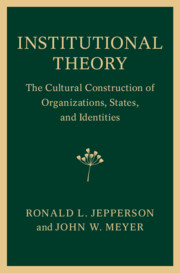Book contents
- Institutional Theory
- Institutional Theory
- Copyright page
- Contents
- Figures
- Preface
- Credits
- Part I Introduction
- Part II Institutional Theory: Its Role in Modern Social Analysis
- Part III The Institutional Level of Analysis
- Part IV Institutions of Modernity and Postmodernity: The Construction of Actors
- Part V Conclusion
- 12 Concluding Reflections:
- Index
- References
12 - Concluding Reflections:
Evolving Cultural Models in Global and National Society
from Part V - Conclusion
Published online by Cambridge University Press: 22 March 2021
- Institutional Theory
- Institutional Theory
- Copyright page
- Contents
- Figures
- Preface
- Credits
- Part I Introduction
- Part II Institutional Theory: Its Role in Modern Social Analysis
- Part III The Institutional Level of Analysis
- Part IV Institutions of Modernity and Postmodernity: The Construction of Actors
- Part V Conclusion
- 12 Concluding Reflections:
- Index
- References
Summary
The cultural frameworks organizing social activity in three distinct periods within the postwar era:embedded liberalism, neoliberalism, and now an emergent postliberal period. As institutional theories were useful in analyzing the effects of liberal models, they are likely to be useful in understanding waves of postliberalism.
- Type
- Chapter
- Information
- Institutional TheoryThe Cultural Construction of Organizations, States, and Identities, pp. 297 - 321Publisher: Cambridge University PressPrint publication year: 2021
References
- 2
- Cited by

